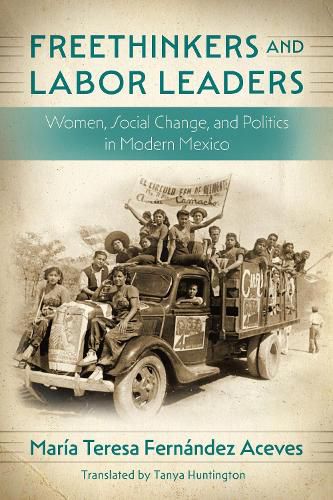Readings Newsletter
Become a Readings Member to make your shopping experience even easier.
Sign in or sign up for free!
You’re not far away from qualifying for FREE standard shipping within Australia
You’ve qualified for FREE standard shipping within Australia
The cart is loading…






The interpretation of the revisionist historiography of the Mexican Revolution (1910-1917) has focused primarily on revolutionary leaders who were men, pushing the heroines of the war to the sidelines. If women happened to be mentioned, they appeared only as symbols, not as social agents. However, the role of the Adelitas, the Cristeras, the Hijas del Anahuac, and the women of the Acrata Group were essential to the Revolution. In Freethinkers and Labor Leaders Maria Teresa Fernandez Aceves tells the stories of five militant feminist women who aided in the creation of a modern culture in revolutionary and postrevolutionary Mexico and, in some ways, Latin America as a whole: Belen de Sarraga Hernandez (1872-1950), Atala Apodaca Anaya (1884-1977), Maria Arcelia Diaz (1896-1939), Maria Guadalupe Martinez Villanueva (1906-2002), and Maria Guadalupe Urzua Flores (1912-2004).
These five women formed part of two cultural generations that participated together in the Mexican Revolution, the consolidation of state cooperative institutions, and the antiestablishment and dissident politics that evolved in the late 1940s. Through these social processes and their struggles as women, mothers, and workers, these women fought for secular education, labor rights, and the civil and political rights of women, redefining cultural and social constructions. Based on original, pathbreaking research, Freethinkers and Labor Leaders demonstrates how five women transformed Latin American society's ideas of citizenship, femininity, masculinity, and politics.
$9.00 standard shipping within Australia
FREE standard shipping within Australia for orders over $100.00
Express & International shipping calculated at checkout
The interpretation of the revisionist historiography of the Mexican Revolution (1910-1917) has focused primarily on revolutionary leaders who were men, pushing the heroines of the war to the sidelines. If women happened to be mentioned, they appeared only as symbols, not as social agents. However, the role of the Adelitas, the Cristeras, the Hijas del Anahuac, and the women of the Acrata Group were essential to the Revolution. In Freethinkers and Labor Leaders Maria Teresa Fernandez Aceves tells the stories of five militant feminist women who aided in the creation of a modern culture in revolutionary and postrevolutionary Mexico and, in some ways, Latin America as a whole: Belen de Sarraga Hernandez (1872-1950), Atala Apodaca Anaya (1884-1977), Maria Arcelia Diaz (1896-1939), Maria Guadalupe Martinez Villanueva (1906-2002), and Maria Guadalupe Urzua Flores (1912-2004).
These five women formed part of two cultural generations that participated together in the Mexican Revolution, the consolidation of state cooperative institutions, and the antiestablishment and dissident politics that evolved in the late 1940s. Through these social processes and their struggles as women, mothers, and workers, these women fought for secular education, labor rights, and the civil and political rights of women, redefining cultural and social constructions. Based on original, pathbreaking research, Freethinkers and Labor Leaders demonstrates how five women transformed Latin American society's ideas of citizenship, femininity, masculinity, and politics.